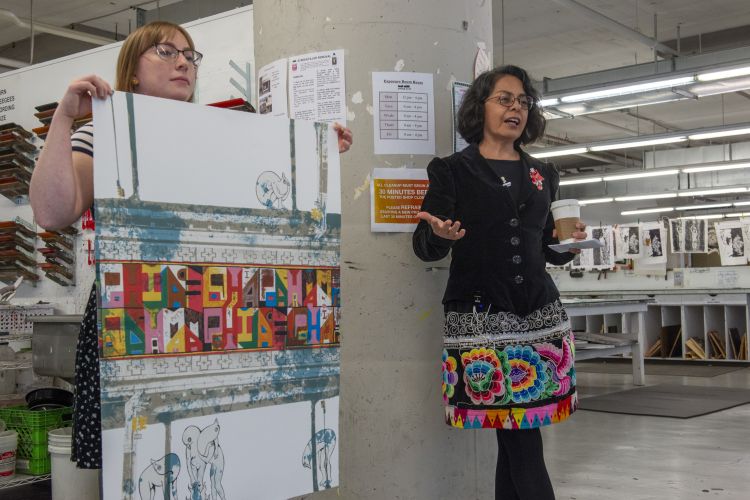STORIES FROM PAFA
Making the most of the PAFA/Penn BFA Program
Since high school, Kathryn “Katya” Dennison (PAFA-Penn Coordinated BFA ’23) has found her passion in traditional oil painting and drawing
She entered PAFA in 2020 with a focused aesthetic at the front of her mind, knowing she could use the PAFA-Penn Coordinated BFA to craft a fine arts and liberal arts education that would allow her to follow her intellectual interests and inform her artistic passions.
Consolidating the four- to five-year combined degree into three, Katya will graduate this spring and participate in PAFA’s iconic rite of passage: the Annual Student Exhibition. The Annual Student Exhibition (ASE), taking place this year from May 12 to June 4, is a long-standing PAFA tradition that affords third- and fourth-year undergraduates and second-year graduate students the opportunity to curate, install, and sell their own works in the museum galleries. Katya will present several large, figurative oil paintings and a series of lithographs, representing influences from her favorite classes at both Penn and PAFA.
When asked, the artist remembers Painting from the Museum Collection as her favorite PAFA course throughout her three years.
“I think that’s the best class. It was so fantastic to sit in the museum and work from the painting in person. Then to go into the archives and read about its conservation and history,” she says about the course, which gives unparalleled access to PAFA’s unique collection.
After a semester spent reproducing a master-copy study of Cecilia Beaux, the first woman critic at PAFA and a gem in the museum’s permanent collection, Katya’s version of Les derniers jours d’enfance will be one of the features of her ASE exhibition.
Marrying art and academic interests
Alongside her studio instruction, Katya made the most of the Coordinated BFA to pursue related academic subjects.
“At UPenn, I focused my classes into three minors: cinema studies, art history, and classical studies, which all inform my artistic practice,” she says.
Some of her most influential classes covered Greco-Roman artifacts and medieval antiquities, as well as a graduate course on the history of Byzantine to Eastern European icon painting. These scholastic topics aligned with studio courses at PAFA, which has long been touted for excellence in figure painting and classical representation: “Iconography too is very much rooted in classical tradition,” she says, “and in my recent paintings I typically include stories from what I’m reading about in my medieval art classes. Each story has possibilities for a lot of different interpretations in your work.”
While the ASE could be considered the culmination of an artist’s PAFA education, Katya is looking ahead to where she can still grow. After graduation, she will participate in a summer program at The Florence Academy of Art and has been accepted to Grand Central Atelier’s Core Program to further her skills in the traditional, academic style. But for now, she is celebrating her final months at two venerable Philadelphia institutions: “I am just very excited and grateful for the opportunity to show my work! I am very appreciative of all of the instruction I’ve been given at PAFA and all the opportunities I’ve been given at UPenn. I know they will serve me well in the future.”


